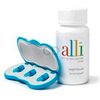 | Alli (Viplena) Active Ingredient: Orlistat Alli is used for managing obesity in overweight adults. |
INDICATIONS
Alli is used for managing obesity in overweight adults. It is also used to reduce the risk of weight regain after previous weight loss. It is used along with a reduced-calorie, low-fat diet. Alli is a gastrointestinal lipase inhibitor. It works by blocking the digestion of fats from the diet.
INSTRUCTIONSUse Alli as directed by your doctor.
- Take Alli by mouth with each meal containing fat. Do not take more than 3 capsules daily.
- If a meal is missed or contains no fat, do not take a dose of Alli.
- Alli may decrease your absorption of vitamins. Take a multivitamin once a day at bedtime.
- If you also take a thyroid hormone (eg, levothyroxine), do not take it within 4 hours before or after Alli. Check with your doctor if you have questions.
- If you also take cyclosporine, do not take it within 2 hours before or after Alli. Check with your doctor before you take Alli with cyclosporine.
- If you miss a dose of Alli, take it as soon as you remember. Continue taking it as directed by your doctor.
Ask your health care provider any question you may have about how to use Alli.
STORAGE
Store Alli between 68 and 77 degrees F (20 and 25 degrees C). Store away from heat, moisture, and light. Do not store in the bathroom. Keep Alli out of the reach of children and away from pets.
MORE INFO:Active Ingredient: Orlistat.
Alli (Orlistat) is the weight loss product, that can help losing about 50% more weight than with just dieting alone.
Do NOT use Alli if:
- you are allergic to any ingredient in Alli
- you are not overweight
- you have gallbladder problems, bile flow problems (eg, cholestasis), or problems absorbing food (malabsorption).
Contact your doctor or health care provider if any of these apply to you.
Some medical conditions may interact with Alli. Tell your doctor or pharmacist if you have any medical conditions, especially if any of the following apply to you:
- if you are pregnant, planning to become pregnant, or are breast-feeding
- if you are taking any prescription or nonprescription medicine, herbal preparation, or dietary supplement
- if you have allergies to medicines, foods, or other substances
- if you have an eating disorder (eg, anorexia, bulimia)
- if you have a history of gallbladder, liver, pancreas, or thyroid problems; diabetes; or kidney stones
- if you take medicine for diabetes or thyroid problems, or if you take any other medicines for weight loss
- if you have received an organ transplant or if you take cyclosporine.
Some medicines may interact with Alli. Tell your health care provider if you are taking any other medicines, especially any of the following:
- Anticoagulants (eg, warfarin) because the risk of bleeding may be increased by Alli
- Amiodarone, cyclosporine, or thyroid hormones (eg, levothyroxine) because their effectiveness may be decreased by Alli.
This may not be a complete list of all interactions that may occur. Ask your health care provider if Alli may interact with other medicines that you take. Check with your health care provider before you start, stop, or change the dose of any medicine.
Important safety information:
- Do NOT take more than the recommended dose without checking with your doctor. Taking more than the recommended dose may not help you lose more weight. It may increase your risk of side effects.
- Proper diet and exercise are important in order to lose weight and keep it off. Follow the diet and exercise program given to you by your health care provider.
- Alli may cause changes in your bowel or stool (eg, gas with oily spotting, loose stools, more frequent stools). Eating a low-fat diet may help lessen these side effects.
- Tell your doctor or dentist that you take Alli before you receive any medical or dental care, emergency care, or surgery.
- Diabetes patients - Alli may affect your blood sugar. Check blood sugar levels closely. Ask your doctor before you change the dose of your diabetes medicine.
- Some patients taking Alli have developed severe liver problems. It is not known if liver problems may be caused by Alli. Contact your doctor right away if you experience yellowing of the skin or eyes, dark urine, pale stools, unusual weakness, loss of appetite, or severe or persistent nausea.
- Alli should not be used in children younger than 18 years old; safety and effectiveness in these children have not been confirmed.
- Pregnancy and breast-feeding: Do not take Alli if you are pregnant. If you become pregnant, contact your doctor. It is not known if Alli is found in breast milk. Do not breastfeed while taking Alli.
All medicines may cause side effects, but many people have no, or minor, side effects.
Check with your doctor if any of these most common side effects persist or become bothersome:
Diarrhea; frequent or loose stools; gas with discharge; oily spotting; trouble controlling bowel movements.
Seek medical attention right away if any of these severe side effects occur:
Severe allergic reactions (rash; hives; itching; difficulty breathing; tightness in the chest; swelling of the mouth, face, lips, throat, or tongue); bloody urine; new or unusual back pain; severe or persistent stomach pain (with or without nausea and vomiting); symptoms of liver damage (eg, yellowing of the eyes or skin, dark urine, pale stools, loss of appetite, severe or persistent nausea).
This is not a complete list of all side effects that may occur. If you have questions about side effects, contact your health care provider.
 OrlistatOrlistat is used for managing obesity in overweight adults.as low as $1.04
OrlistatOrlistat is used for managing obesity in overweight adults.as low as $1.04 HoodiaHoodia has received publicity in recent times for its natural appetite suppressant properties.as low as $1.08
HoodiaHoodia has received publicity in recent times for its natural appetite suppressant properties.as low as $1.08 AlliAlli is used for managing obesity in overweight adults.as low as $1.01
AlliAlli is used for managing obesity in overweight adults.as low as $1.01 CharbolepsObesity is the condition or physical state of the body when excessive deposition of fat takes place in the adipose tissue.as low as $29.01
CharbolepsObesity is the condition or physical state of the body when excessive deposition of fat takes place in the adipose tissue.as low as $29.01 XenicalXenical is an oral weight loss medication used to help obese people lose weight and keep this weight off. as low as $0.89
XenicalXenical is an oral weight loss medication used to help obese people lose weight and keep this weight off. as low as $0.89 Slim TeaThe Original Austro Slim Tea is herbal combination of all natural herbs and green tea which is very rich in anti oxidants having therapeutic values.as low as $18.84
Slim TeaThe Original Austro Slim Tea is herbal combination of all natural herbs and green tea which is very rich in anti oxidants having therapeutic values.as low as $18.84